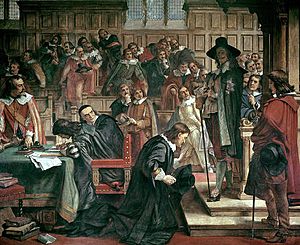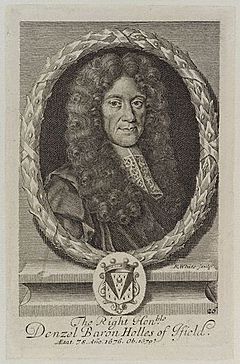Denzil Holles, 1st Baron Holles facts for kids
Quick facts for kids
The Lord Holles
JP PC
|
|
|---|---|
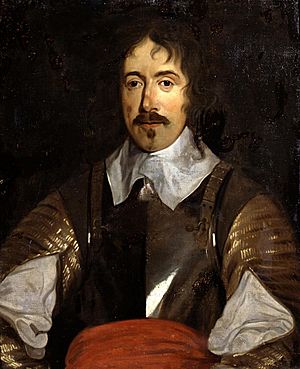
Portrait by Edward Bower, c. 1640
|
|
| English Ambassador to France | |
| In office 1663–1666 |
|
| Preceded by | Ralph Montagu |
| Succeeded by | Henry Jermyn |
| Custos Rotulorum of Dorset | |
| In office 1660–1680 |
|
| Preceded by | Francis Cottington |
| Succeeded by | John Digby |
| Privy Counsellor | |
| In office 1660–1676 |
|
| Member of Parliament for Dorchester |
|
| In office February 1628 – April 1661 |
|
| Preceded by | James Gould |
| Succeeded by | John Churchill |
| Member of Parliament for Mitchell |
|
| In office February 1624 – March 1625 |
|
| Preceded by | Sir Richard Carew |
| Succeeded by | Henry Sandys |
| Personal details | |
| Born |
Denzil Holles
31 October 1598 London, Kingdom of England |
| Died | 17 February 1680 (aged 81) London, Kingdom of England |
| Resting place | Westminster Abbey |
| Political party | |
| Spouses |
Dorothy Ashley
(m. 1626; died 1640)Jane Shirley
(m. 1642; died 1666)Esther le Lou
(m. 1666) |
| Children | Francis |
| Alma mater | Christ's College, Cambridge |
| Occupation | Politician |
| Military service | |
| Allegiance | |
| Rank | Colonel |
| Unit | Colonel Denzil Holles' Regiment of Foot |
| Battles/wars | |
Denzil Holles (born October 31, 1598, died February 17, 1680) was an important English politician. He is best known as one of the "Five Members." King Charles I tried to arrest these members in 1642. This event helped start the First English Civil War.
When the war began, Holles led a Parliamentarian army group. They fought at the Battle of Edgehill. His military career ended after a tough battle at Brentford in November 1642. After this, he became a leader of the 'Peace Party' in Parliament. This group wanted to make a deal with the King. Holles was from a rich family and believed in traditional ways. He thought radical groups like the Levellers and religious Independents (like Oliver Cromwell) were more dangerous than the Royalists.
After the first part of the English Civil War, Holles opposed Cromwell. He was one of the "Eleven Members" who were suspended from Parliament in 1647. He was allowed back for a short time. But he was removed again in December 1648 and had to leave England. He returned home in 1654.
When King Charles II returned to power in 1660, he made Holles a Baron. Holles also served as the English Ambassador to France from 1663 to 1666. This job was not very successful. Later, Holles joined the Whig opposition group. He supported laws that limited the power of the Catholic heir to the throne, James, Duke of York. Denzil Holles died in February 1680 and was buried in Westminster Abbey.
Contents
Who Was Denzil Holles?
Denzil Holles was born on October 31, 1598, in London. He was the second son of John Holles, 1st Earl of Clare. His mother was Anne Stanhope. He had four brothers and sisters who lived to be adults.
In 1626, Holles married Dorothy Ashley. They had four children, but only one son, Francis, lived to adulthood. Dorothy died in 1640. Holles married Jane Shirley in 1642, but she died in 1666. Six months later, he married Esther le Lou. He had no more children from his last two marriages.
Early Life and Political Beginnings
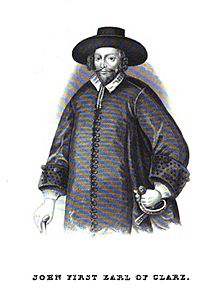
Denzil's father, John Holles, was a very rich landowner. He owned large areas of land in Nottinghamshire and Cornwall. He spent a lot of money to buy noble titles for himself. Denzil was seen as "the angry younger son of a bitter and disappointed father."
From 1611 to 1615, Holles studied at Christ's College, Cambridge. He then trained to be a lawyer. In 1624, he became a Member of Parliament (MP) for Mitchell. This area was near his family's lands. He did not do much in this Parliament. It ended when King James I died in 1625.
Holles was a Presbyterian, a type of Protestant. Like many Puritans, he disliked King Charles I's policies. He especially opposed the King's close ties with Catholic Spain. After a terrible military failure in 1627, Holles wrote that England had never suffered "so dishonourable a blow."
In 1628, he became an MP for Dorchester. He helped support the Petition of Right. This document limited the King's power. In 1629, he famously helped stop the Speaker of the House from leaving. This prevented King Charles from dissolving Parliament. A week later, Charles dissolved Parliament anyway. For the next eleven years, Charles ruled without Parliament. Holles and others were fined and kept quiet during this time.
Leading Up to the Civil War (1640-1642)
King Charles had to call Parliament again in 1640 because of wars. Holles was elected MP for Dorchester in both the Short and Long Parliaments. Soon after Parliament met, people in London sent a petition. They wanted to remove bishops from the Church of England. They also wanted to end "Catholic practices."
Many people thought King Charles might ally with Catholic Spain. Ending his control over government policy became very important. Instead of attacking the King directly, Parliament went after his advisors. In December, they started to remove Archbishop Laud and Strafford from power. Holles tried to stop Strafford's execution in May 1641. He also helped make a peace deal with the Scots in August.
Parliament passed new laws to limit the King's power. These included laws about how often Parliament had to meet. They also got rid of the Star Chamber, a special court. Bishops in the House of Lords blocked some of these changes. Holles opposed bishops being in the Lords, not for religious reasons, but because of their power.
The start of the Irish Rebellion of 1641 in October made things worse. Both the King and Parliament wanted to raise an army. But neither trusted the other to control it. Holles helped write the Grand Remonstrance. This was a list of complaints presented to Charles in December 1641. This led to the creation of a Royalist party. These Royalists felt Parliament was taking too much power.
On December 30, 1641, twelve bishops signed a complaint. They said laws passed without them were illegal. Holles and others in Parliament said this was treason. All twelve bishops were arrested.
On January 4, 1642, King Charles tried to arrest five MPs, including Holles. But he failed. Charles then left London with his Royalist supporters. This was a big mistake. It gave Parliament control in both houses.
Both sides prepared for war. Holles helped organize the local army in Dorset. He then returned to London to raise his own infantry regiment. In August, he joined the main Parliamentarian army. He fought in one of the first battles of the war at Southam. His regiment also helped prevent a total defeat at Edgehill in October. However, his regiment was almost destroyed at Brentford in November.
Holles During the Civil War (1643-1659)
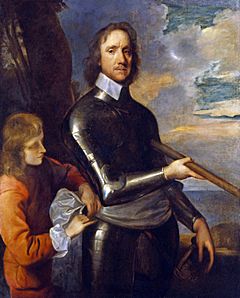
Holles did not want the war to happen. The war even divided his own family. His cousin fought for the Royalist army. The heavy losses suffered by his regiment at Brentford made Holles a leader of the 'Peace Party'. This group wanted to negotiate with the King. This caused a disagreement with other Parliament leaders.
In May 1643, a plot was discovered. Some moderates wanted to take control of London. They planned to arrest the 'War Party' leaders and negotiate with the King. Holles likely knew about this plan. But he avoided arrest. This event made Parliament even more against a peace deal.
The King refused to negotiate until the war turned against him. Holles represented Parliament in peace talks in 1644-1645. But these talks did not make much progress.
The New Model Army was formed in 1645. This army helped defeat King Charles. He surrendered in May 1646. But the New Model Army was led by religious Independents like Oliver Cromwell. Holles strongly opposed them. Many soldiers also belonged to radical political groups. Presbyterians like Holles saw the New Model Army as more dangerous than the Royalists.
In 1647, Parliament tried to send the New Model Army to Ireland. They said only those who went would be paid. But the army refused to go without full payment. Parliament then tried to disband the army, but they refused to obey.
In June, the Army Council took King Charles from his prison. They offered him their own terms for peace. He rejected them. Parliament, backed by the London army, wanted to invite the King to London. They hoped for more talks. But Cromwell's soldiers entered London in August. They demanded the removal of opposition leaders. Holles was at the top of this list. He escaped to France.
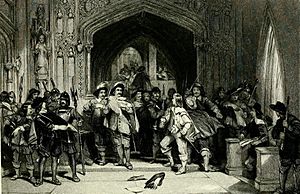
When the Second English Civil War began in April 1648, Holles returned to London. Even after the Royalists were defeated again, he kept negotiating with King Charles. But Charles still refused to make real concessions. The army found messages from Charles telling his supporters to ignore any deals he made. The army then said more talks were useless.
On December 5, Holles suggested continuing discussions. Parliament agreed. This led to Pride's Purge the next day. Soldiers arrested MPs who had voted to continue talks. Holles was warned and escaped to France again.
While in exile, Holles refused to become King Charles II's Secretary of State. He did not take part in the 1651 war. In March 1654, Oliver Cromwell offered forgiveness to Presbyterian exiles. Holles accepted and returned home.
After the Restoration (1660-1680)
Oliver Cromwell died in 1658. His son Richard resigned in 1659. This led to the return of the monarchy in 1660. Holles was elected to Parliament in April 1660. He was part of the group sent to invite King Charles II to return. Holles wanted to restore the monarchy with limits on its power. But Royalists wanted to go back to how things were before the war. In the end, many reforms from 1641 were kept. But bishops were brought back into Parliament and the Church of England.
King Charles II appointed Holles to his Privy Council in June. He also made him a local official in Dorset. Holles was one of the commissioners who tried those who had executed Charles I. In April 1661, he became Baron Holles. This made him a member of the House of Lords.
He became Ambassador to France in July 1663. This job was not successful. He was very strict about rules, which annoyed the French. King Charles had to talk to the French King through other people.
Holles was called back to England in January 1666. France had joined the Second Anglo-Dutch War against England. In November, a diarist named Samuel Pepys wrote that Holles "wept to think in what a condition we are fallen." In April 1667, Holles helped negotiate a peace treaty with the Dutch.
Holles had been against the war. But the King's chief minister, Clarendon, was blamed for its failure. Clarendon was forced into exile. Holles argued against this. His home became a meeting place for opposition leaders. He opposed a law in 1670 that punished religious groups outside the Church of England. He also thought England's alliance with France was a betrayal of the Protestant cause.
In 1673, King Charles's brother, James, became Catholic. This raised fears of a Catholic king. Holles and other peers attacked James in Parliament. In 1675, James offered pardons for those punished under the religious laws. Holles supported this at first. But Charles made James withdraw the idea.
Holles then opposed a law that required members to swear loyalty to the Crown. He said the King had no right to demand such things. In 1676, Holles wrote that Parliament should meet more often. He said this would help control the King's growing power. He was removed from the Privy Council for this.
He was brought back during the "Popish Plot" in 1679. This was a time of political trouble. People feared a Catholic plot against the King. During the "Exclusion Crisis," people tried to stop James from becoming king. Holles supported allowing James to be king with strict limits. He died on February 17, 1680, and was buried at Westminster Abbey.
Images for kids
 | Stephanie Wilson |
 | Charles Bolden |
 | Ronald McNair |
 | Frederick D. Gregory |


